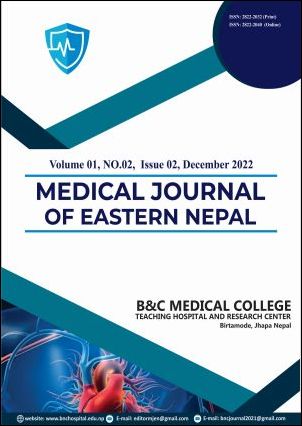Cardiovascular Risk Factors are Linked to Venous Thromboebolism: A systematic review and meta-analysis of case-control studies
DOI:
https://doi.org/10.3126/mjen.v1i02.51144Keywords:
Cardiovascular, Risk factor, ThromboembolismAbstract
Background Cardiovascular risk factors are associated with venous thromboembolism (VTE) has received increased attention in the past few years. At present, it is not clear whether the each cardiovascular risk factor is risk factor for venous thromboembolism. Features of cardiovascular risk factor have shown to be been individually associated with VTE. However, whether each of the factors additively increases the risk of VTE is uncertain. We performed a meta-analysis to assess the association between some major cardiovascular risk components and VTE.
Methods Online Pub Med and Embase database were searched for case-control studies evaluating cardiovascular risk factors and incident Venous Thromboembolism in adults. Independent observers extracted data regarding annualized VTE incidence from studies meeting predetermined criteria, (Blood pressure: ≥ 140/90 mmHg. Dyslipidemia: triglycerides (TG): ≥ 1.695 mmol/L and high-density lipoprotein cholesterol (HDL-C) ≤ 0.9 mmol/L in male, ≤ 1.0 mmol/L in female, waist circumference ≥90cm for men, ≥80cm for women or body mass index > 30 kg/m2. Data were analyzed weighted, random-effects meta-analysis.
Results Thirty two case-control studies with a total of 30929 patients met the inclusion criteria. Odds ratios or weighted means and 95% confidence intervals (CIs) were then calculated and pooled using a random-effects model. Statistical heterogeneity was evaluated through the use of X2 and I2 statistics. Compared with controls, the OR for VTE was 2.24 for obesity (95% CI, 1.83 to 2.75), 1.56 for hypertension (95% CI, 1.26 to 1.92) and 1.55 for diabetes mellitus (95% CI, 1.25 to 1.92). Weighted mean high-density lipoprotein cholesterol (HDL) levels were significantly lower in VTE patients with cardiovascular risk factor compared to controls with inverse correlation with risk of VTE, whereas no difference was observed for total cholesterol levels.
Conclusion Cardiovascular risk factors are significantly associated with higher risk of VTE, which may imply that it may contribute to the multi factorial pathogenesis of VTE. Nevertheless, this report could not determine whether the combination of all three components is associated with a higher risk than each of the components in isolation.
Downloads
Downloads
Published
How to Cite
Issue
Section
License
Copyright (c) 2022 B & C Medical College and Teaching Hospital and Research Centre

This work is licensed under a Creative Commons Attribution 4.0 International License.
CC BY: This license allows reusers to distribute, remix, adapt, and build upon the material in any medium or format, so long as attribution is given to the creator. The license allows for commercial use.




